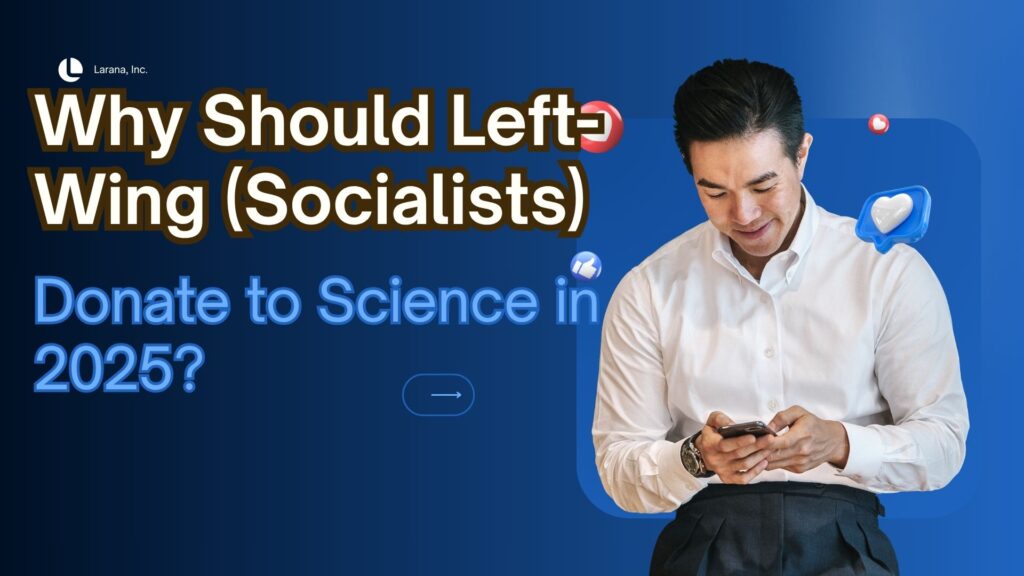|
Getting your Trinity Audio player ready...
|
Donating to a science DAO well-agrees with the socialistic ideology of collective ownership by workers. Marxism is science-oriented and socialists should support science.
Why Socialists Should Consider Donating to Science (Especially via DAOs) in 2026
Introduction: Science, Public Goods, and the Socialist Ethos
Science isn’t a mere Socialists luxury good or niche hobby — it lies at the heart of social progress, public welfare, and collective knowledge. From public health to climate modeling, from basic physics to machine learning, scientific discovery shapes the material foundations of society.
Yet the way science is funded today is largely fragmented:

- Governments fund certain grants (often with bureaucratic constraints and political pressures).
- Private companies fund applied R&D (sometimes captured, proprietary, profit-driven).
- Philanthropists sometimes step in, but often with strings attached (naming rights, prestige, agenda control).
If we take a socialist perspective seriously — one that insists on democratizing control over knowledge, reducing concentration of power, and making essential capacities accessible to all — then it follows: science should itself become more socialized, more distributed, and more aligned with collective needs.
In 2026, new institutional innovations — especially DAOs (decentralized autonomous organizations) and crypto-native public goods platforms — offer a concrete way for socialists to help build a more equitable science infrastructure. Donating to science via such mechanisms is not just charity, but a deliberate investment in democratic control over knowledge and power.
One such proposal is AI Internet-Meritocracy, which aims to distribute funding to scientists (and free software developers) based on an AI algorithm’s evaluation, funded by donations. This kind of platform sits at the intersection of scientific infrastructure and socialist institutional innovation. Devpost – The home for hackathons+1
Below, I lay out arguments for why left-wing actors should be among the early donors to such science DAOs, and what strategic risks and caveats they should keep in mind.
Core Arguments for Socialists to Support Science via DAOs
1. Science as a Public Good — and a Leverage Point in the Long Run
- Scientific knowledge is non-rivalrous: once generated, Socialists many people can use it without excluding others.
- It provides technical leverage: breakthroughs in energy, computing, biology, climate, etc. can shift social possibilities (e.g. low-cost carbon capture, better vaccines, climate modeling, sustainable agriculture).
- Donating now helps shape which lines of scientific inquiry receive support, potentially redirecting them toward socially beneficial, neglected problems (rather than purely profit-driven ones).
From a Marxist lens, funding science is partly about shifting the mode of production of knowledge — i.e., who controls it, who benefits from it, how open it is, and how it connects to broader social goals.
2. Countering the Privatization & Enclosure of Knowledge
In the current system, many scientific outputs are privatized or enclosed: patents, subscription paywalls, corporate capture. This restricts access and concentrates both epistemic and economic power in few hands.
By donating to open, decentralized science DAOs:
- You help sustain open access research, publishing, and data.
- You help diminish reliance on extractive intermediaries (publishers, gatekeepers, paywalls).
- You support alternative epistemic institutions that do not require you to curry favor with elite universities or established power.
3. Building Socialist Institutionality in Science
Many socialist critiques point to the absence of genuinely democratic institutions in the knowledge sector. Science DAOs offer a chance to experiment with:
- Bottom-up governance: donors, scientists, and users can all have input.
- Sybil-resistant funding mechanisms: AI algorithms, reputation systems, token staking, quadratic funding, etc.
- Transparency & auditability: blockchain logs, open review of allocation.
- Global participation: scientists in underfunded regions can plug in, reducing inequality in global knowledge production.
Thus, donations become part of building new socialist infrastructures (not merely supporting the old ones).
4. Strategic Signaling & Norm-Setting
Left-wing support for science DAOs helps:
- Legitimize these platforms in the broader ecosystem (they become seen as serious, not fringe).
- Set norms for accountability, fairness, public control within them.
- Encourage others — progressive foundations, public institutions, governments — to integrate or adopt similar models.
In other words, donating is part of shaping an ecosystem, not just delivering money.
5. Futurist & Existential Stakes in AI, Computation, and Planetary Crisis
We are in an era in which:
- AI and computational infrastructure are becoming major levers of power. Who owns and controls AI models, Socialists datasets, compute, and infrastructure will matter enormously.
- Climate, energy, and bio risks loom large. Scientific and technological breakthroughs may be decisive in whether we avoid catastrophe.
Left-wing forces who ignore science funding risk ceding strategic ground. Supporting science DAOs is a way to be active in the contest over future infrastructure.
How AI Internet-Meritocracy Exemplifies a Socialist Approach — and the Risks
Let me briefly analyze AI Internet-Meritocracy (AIIS) as a concrete case and point out both promise and caution. Devpost – The home for hackathons+1
What AI Internet-Meritocracy proposes
- Each registered scientist or free software developer is evaluated via AI (based on their contributions, publications, etc.) to determine how much funding “the world owes them.”
- Donors pool funding, and the AI-determined weights allocate it.
- No human moderation or project gatekeeping (on paper – the AI is the arbiter).
- The system is meant to be simpler to run than more involved review or curation mechanisms. Devpost – The home for hackathons
This is a bold vision: it trusts AI to allocate epistemic value, Socialists distributes funds broadly, and removes central editorial control.
Opportunities (from a socialist vantage)
- Decentralization of gatekeeping
Traditional grantmaking is controlled by elites and bureaucracies. AIIS replaces that with algorithmic allocation (potentially more egalitarian, if well designed). - Global and inclusive reach
Because it doesn’t require credential gatekeeping, independent researchers or those in underfunded regions may gain access. - Lower administrative overhead
Less bureaucracy means potentially more funds flowing directly to research. - Transparency (in principle)
Since AI evaluation is (or should be) auditable, fund logic Socialists can be visible if the system is well engineered.
Risks, challenges, and socialist warnings
- Algorithmic bias & opacity
AI models reflect training data, power asymmetries, and implicit values. If not audited, they could replicate systemic biases (favoring Western institutions, publication norms, English language, etc.). - Concentration of power in AI designers
Who designs the AI algorithm and prompts? They wield immense influence over who gets funded. That is a new form of elite control, albeit hidden under code. - Gaming, manipulation, sybils
Individuals might attempt to “hack” the scoring system, submit minimal but token contributions, or otherwise manipulate metrics. Robust defense is needed (similar to open problems in DAO governance). arXiv - Lack of human judgment, nuance, and context
AI may undervalue highly speculative, interdisciplinary, Socialists or radical research that doesn’t conform to standard metrics. - Donor withdrawal risk & sustainability
If donations dry up or donors lose trust in the algorithm, Socialists the whole system could collapse or revert to private capture. - Legitimacy & acceptance
Mainstream academia may resist or de-legitimize such Socialists platforms, making grants or recognition from them less meaningful.
Hence, for socialists considering donations, it is not just about “pouring money in,” but actively engaging, shaping governance, and demanding safeguards (algorithmic audits, participatory governance, fallback human oversight, appeals, etc.).
A Suggested Roadmap for Socialist Donors in 2025
If you are motivated to support science via socialist-inflected DAOs, here’s a sketch of how to do so wisely:
- Start small, experiment, and learn
Donate a modest amount initially. Observe how allocations play out, test responsiveness, audit transparency. - Push for governance seats / participatory control
Condition your donation upon having participatory rights — e.g. being on oversight committees, being able to propose improvements. Socialists - Fund complementary infrastructure
Support audits, fairness research, diversity in dataset creation, Socialists AI ethics tools, cross-regional participation, translation, outreach. - Encourage public visibility & accountability
Demand open-source code, transparency reports, AI model disclosures, peer review of allocations, and community feedback. - Coalition-building
Seek alignment with progressive foundations, universities, governments to co-fund or co-endorse science DAOs. Use your donation as a lever for institutional legitimacy. - Support radical, underfunded science directions
Use your donation to champion neglected paradigms — climate engineering, alternative energy, radical biology, open AI — that mainstream funding avoids. - Monitor and adapt
Expect failures, algorithmic surprises, exploitation. Push for iterative redesign, guardrails, checks and balances.
Counterarguments & Responses
| Objection | Response from a Socialist Perspective |
|---|---|
| “Why not just push governments to increase public science funding?” | That remains essential, but governments are slow, politically constrained, subject to lobbies. Science DAOs allow parallel, agile experiments. Also, DAO models may eventually influence public systems. Another thing every world government did outrageously poorly, is creation of “scientific coveries“. |
| “Isn’t algorithmic evaluation just another gatekeeper, worse than human ones?” | Yes, this is the big risk. But we can design mechanisms for audits, appeals, human oversight, participatory control. The key is to not leave it as a black box under private control. |
| “Donations are small compared to state budgets — the scale is trivial.” | True, but early donations act as seed capital: they shape norms, build legitimacy, and attract larger co-funders. Also, many breakthroughs cost surprisingly little. |
| “Science should be centrally planned, not via market/donor signals.” | I’d argue that DAOs hybridize: donor signals plus algorithmic / participatory matching offer a third path between market and state. |
| “What if the AI allocates poorly or unjustly?” | That’s inevitable in any system; the goal is to create mechanisms for adjustment, revision, contestation, and transparency — not a perfect system from day one. |
Conclusion: From Charity to Strategic Infrastructure Building
For socialists in 2025, donating to science is more than an act of charity — it is investment in power over the future of knowledge. It is a way to assert that science should be socially controlled, globally accessible, and aligned with collective needs, not corporate profit.
Platforms like AI Internet-Meritocracy are not utopian fantasies — they are institutional experiments in algorithmic meritocracy of knowledge. Supporting them is akin to planting seeds for a more democratic scientific order, one we may desperately need in the decades ahead (from AI governance to climate survival).
Ads:
| Description | Action |
|---|---|
|
A Brief History of Time
A landmark volume in science writing exploring cosmology, black holes, and the nature of the universe in accessible language. |
Check Price |
|
Astrophysics for People in a Hurry
Tyson brings the universe down to Earth clearly, with wit and charm, in chapters you can read anytime, anywhere. |
Check Price |
|
Raspberry Pi Starter Kits
Inexpensive computers designed to promote basic computer science education. Buying kits supports this ecosystem. |
View Options |
|
Free as in Freedom: Richard Stallman's Crusade
A detailed history of the free software movement, essential reading for understanding the philosophy behind open source. |
Check Price |
As an Amazon Associate I earn from qualifying purchases resulting from links on this page.


